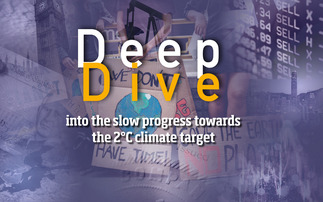At the heart of Fidelity's sustainable investing strategy is a proprietary Environmental, Social and Governance (ESG) ratings approach rolled out since 2019 and being refined during 2021. Much of the industry, Jenn-Hui Tan says, follows a 'quantamental' model, which assembles data about a company from a variety of third-party sources and weights each in various ways depending on industry sector and other materiality-based factors.
The benefit of top-down rating models is that you can scale them quickly, for example, to cover over 10,000 issuers, so long as you can access data. But Tan has doubts: "The first problem is that you are really only as good as the data that you are buying," he says, "and most data is non-standardised, non-verified, and not necessarily comparable."
The second is a broader philosophical problem. "When a few years ago we used quantamental ratings to show portfolio managers how sustainably their funds were constructed, we found they might agree they had a D-rated company but argue that was because they believed the company would improve going forward," he says. If correct, that belief might be critical in directing capital towards positive change, but it needed to be documented and its validity tracked.
Investment integration
"We realised, going into 2019, that if we wanted to integrate sustainability in a genuine way to our investment process, we'd need to integrate ex-ante rather than ex-poste: it must be part of the way fund managers make their investment decision," he says. That meant building sustainability ratings using a more ground-up approach.
So the team rebuilt their model and put it in the hands of the analysts who drive the Fidelity business. "We told them, we've built this for you but, company by company, you're the ones that have to do the research. Find the data, get it from primary sources, or whatever sources you can including company meetings. If you can't do that, form a view in the face of uncertainty. Then create an ESG rating."
The big difference between Fidelity's proprietary ratings and most third-party ratings is their forward-looking nature. "If you're rating is based on what companies are disclosing, then you are rating what they've done in the past; you're not trying to forecast," he says. "Our analysts consider what companies have done in the past because it's an important indicator of what may happen in the future - but our approach is based on our company interactions and therefore places a greater weight on a company's direction of travel with respect to sustainability."
Using analyst expertise also helps the firm to build ratings that focus on the core sustainability topics for each sector - taking account of local peer and market practice - which is especially important in areas such as Asia, where Fidelity is a leading investor. Tan believes that none of the key global challenges can be solved without addressing Asia.
Future forward
Fidelity's new ratings approach, launched in June 2019, had achieved coverage of over 4,400 issuers by early 2021, and this year the firm is embarking on an ambitious revision of the granularity and focus that its analysts place on each key sustainability factor.
The revision will also shift the focus further away from financial materiality towards what Tan calls ‘double materiality'. "The dominant view previously was that investors looked at ESG factors because they posed a material financial risk to the company", he explains. "But increasingly we also want to ask much more directly: What is the material impact of companies on the environment and society?"
Click here to explore our new interactive guide on Fidelity's distinctive approach to sustainability - and how this informs investment decisions while powering positive change in the world
Important Information
This information is for investment professionals only and should not be relied upon by private investors. The value of investments (and the income from them) can go down as well as up and you may not get back the amount invested. Past performance is not a reliable indicator of future returns. Investors should note that the views expressed may no longer be current and may have already been acted upon. Changes in currency exchange rates may affect the value of an investment in overseas markets. Investments in emerging markets can be more volatile than in other more developed markets. Reference to specific securities should not be interpreted as a recommendation to buy or sell these securities, but is included for the purposes of illustration only. A focus on securities of companies which maintain strong environmental, social and governance ("ESG") credentials may result in a return that at times compares unfavourably to similar products without such focus. No representation nor warranty is made with respect to the fairness, accuracy or completeness of such credentials. The status of a security's ESG credentials can change over time. Investments should be made on the basis of the current prospectus, which is available along with the Key Investor Information Document, current annual and semi-annual reports free of charge on request by calling 0800 368 1732. Issued by Financial Administration Services Limited, authorised and regulated by the Financial Conduct Authority. Fidelity, Fidelity International, the Fidelity International logo and F symbol are trademarks of FIL Limited. UKM0321/34016/SSO/NA












